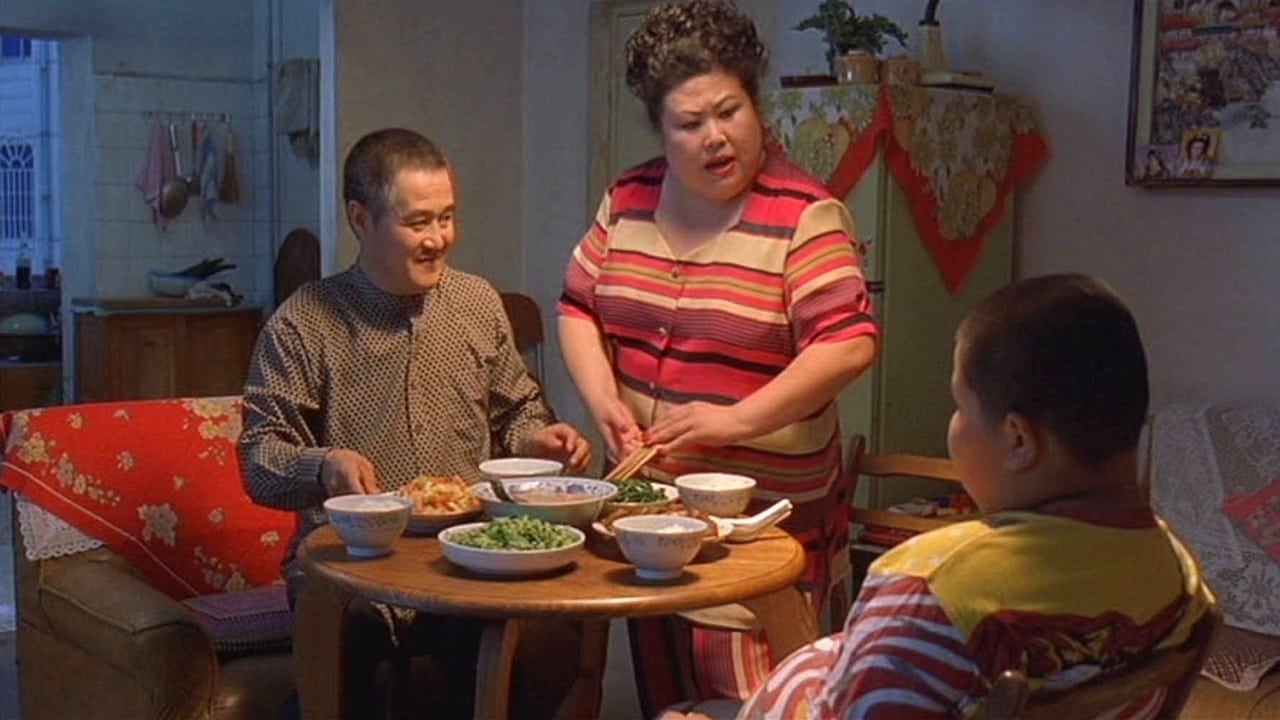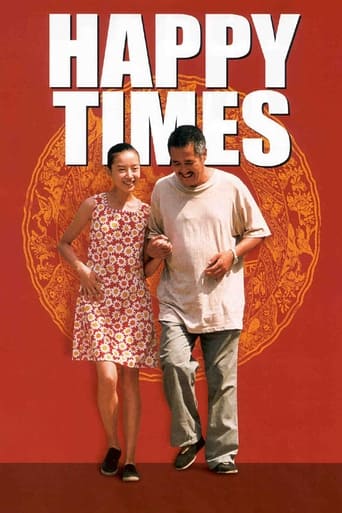Lollivan
It's the kind of movie you'll want to see a second time with someone who hasn't seen it yet, to remember what it was like to watch it for the first time.
Alistair Olson
After playing with our expectations, this turns out to be a very different sort of film.
Nicolas
Ok... Let's be honest. It cannot be the best movie but is quite enjoyable. The movie has the potential to develop a great plot for future movies
Wyatt
There's no way I can possibly love it entirely but I just think its ridiculously bad, but enjoyable at the same time.
Paul Magne Haakonsen
Being a fan of Asian cinema, I decided to give this movie a go, so I purchased it from Amazon, and having just seen it, I can honestly say that I think something is missing from this movie. It is a great movie, but there is just something missing to make it that one notch more memorable. And I must admit that I had expected the movie to be more of a comedy than a drama about life.**Warning! The following part here contains spoiler to the ending of the movie.**Perhaps it was the semi-lousy ending to the movie. After all of Zhao's (played by Benshan Zhao) effort to give Wu Ying (played by Jie Dong) a purpose in life and make her life meaningful, he ends up in a hospital, and we don't get to know his fate? That was not very satisfactory to me. However, I will say that seeing Wu Ying on the street alone walking off at the end was just beautiful. It was nice to see that she was determined to make an effort and try on her own.The story itself was nice, Zhao is courting a woman (played by Qibin Leng) and ends up having to take care of her blind girl. But with little means and nothing real to offer, Zhao is put to the test. A test of the heart, so to speak.I found the acting in "Happy Times Hotel" to be quite good, and most memorable was Jie Dong. She portrayed the blind girl, Wu Ying, so nicely and so believable."Happy Times Hotel" is a great movie, a beautiful movie, just a shame that it started to fall apart towards the end. The movie could have been so much more if the director (Yimou Zhang) had opted to go a different direction. I felt that us viewers were left with so many unanswered questions to the story, and that was a shame, because it made the movie feel incomplete. But still, given the great story, then this movie is well worth checking out.
dane-70
The fact that some readers confidently state the presumed political "allegory" of this film (which I frankly can't see) while others criticize it as if it were realistic (what? seven adults confining a girl to a massage parlor against her will?) gives some idea of why it's both interesting and powerful. I was never entirely sure what genre I was in while watching this--comedy? surreal fantasy? social commentary? sit com? romance? absurdist play?--and maybe because of that I never worried about the implications it might have for any of these, nor did I steel myself against its emotional aspects (why bother? it's just a surreal play!). The main focus emerges from this haze of characters and comedic situations about half way through. I'm told that some details early on in the film (the 'girl- friend' and her pampered, insolent, fat, lazy kid) are comments on an increasingly common family phenomenon in China; I wouldn't know. But once the focus settles on the main group of characters, I could not shake the notion that they constitute an absolutely dead-on representation of American bourgeois family life (or perhaps just those I've had experience with!) where each member, with the best of intentions, deceives everyone else in order to protect them from ... what? economic distress? emotional distress? And where emotions and love can only be expressed in the most oblique and often futile ways.
jeeber-1
This movie carefully set up a lot of comic situations - an old man (Zhao), lost in his own denials of his incompetence, who is infatuated with a fat woman, and blind to the fact that she is a completely selfish money grubber, and in fact is lying left and right to try and impress her, because he has nothing to offer. He tries to make money by setting up a make-out room in an abandoned bus but he is too morally upright to allow the customers to use it. He tries to do a favor for the fat lady by taking her unwanted blind step child (Yu) and giving her a fake job at the bus (the "Happy Times Hotel"). He loses the bus so he makes a fake massage parlor for the blind girl. All of this is very amusing. It is clearly a comedy so far, set in a Cinderella-like story.Maybe it's just the American in me, but at this point, I was expecting two things to happen at some point in the movie: 1. The old man would come to realize what a witch the fat woman was. 2. His charming, scam artistry incompetence would somehow accidentally make their lives better, because, so far, it hasn't really done much for anybody.The fat lady's greed and wanton abuse of her step daughter don't seem to have any effect on Zhao, inexplicably. We would feel for his plight at not getting the favor of the fat lady, except: 1. She isn't worth it, and 2. He seems just as culpable because he ignores the abuse. So, there's no sympathy for any of the characters except for the blind girl.Eventually, of course, we come to feel for Zhao as he comes to start caring for Yu. But he can't support her himself, he's nearly broke as it is. It is amazing that he and his old co-workers can come up with the amazingly complex charade of a massage parlor, yet get stuck with the problem of having to have paying customers for Yu. They just keep going themselves, and making fake money after a while. How does it not occur to any of them to try and get real customers? It would have gone like this - The fake parlor would transform into a real parlor. Wild, unexpected success. Zhao shares in the money, is starting to be well off at last. Shows off to fat lady, dumps her. Massage parlor gets busted (by government?), or they get evicted from the factory, losing everything they gained. Yu confesses to Zhao that she knew what was going on all along, but she was very thankful none-the-less. With some small savings, she sets out into the world and tries to get a real job as a masseuse, which is easier now that she has experience and a good reputation from her disappointed customer base. Zhao is back where he started, but now he is happier because he feels that at last he has done some good in the world. Happy Times.Instead, they continue using fake money. Yu presents a letter for Zhao to read, which is from her father, which hasn't been read to her by her evil step-mom. Zhao reads it, literally. It sucks. She asks if there's more. I totally expected him to make up something nice on the spot, something poignant and meaningful to make her feel better, and realizing that although he's pretending it's from her father, it's really from him. Instead, he fumbles and decides to do that later. Apparently it's so hard for him to access real emotions that he has to work on it. Yu knows her life with him is a sham, so she leaves, leaving him a recording saying how thankful she was. Zhao writes the fake letter from her father, but before he can deliver it, he gets dumped by fat woman, and is so upset that he gets drunk and gets hit by a bus. Neither recording or note makes it to the other. Super duper, huge tragic ending. WTF???? How about: He makes up a nice letter from her father on the spot, at the restaurant. He realizes later that he really meant it, but knows that Yu thinks it's from her father, and is sad to think she doesn't know how he feels. Yu leaves for the big city, but leaves behind a tape: I know that my father didn't write what you said, and that you said it from your own heart. Wow. Beautifully touching ending to a funny movie.It may be that Zhang Yimou can only do tragedies, (which he does exceptionally well), which is a shame, because the first half of the movie was very funny, with the characters and situations. But it got sucked right into pointless tragedy land. This was a most jarring ending to a movie that took a wrong turn somewhere in the middle.My advice is to stop watching it right after the restaurant scene where he reads the letter from her father to her. It just goes straight downhill from there.
dbaskaya
It is a great movie... Yimou Zhang is one of the greatest directors on earth but one of the most overlooked talents. The world doesn't stop at Hollywood. Many great talents become overshadowed by the high budget Hollywood movies(and most of these movies literally don't tell "anything" to their audience). This is a movie with a stand, it presents a world-view and most importantly it is humane... It has a story with sub-texts and in these sub-texts, most people may find many details familiar to their emotional experiences. It is an intimate movie because it tells about "the good side of the mankind that we all must preserve in ourselves". I recommend it to everyone.

